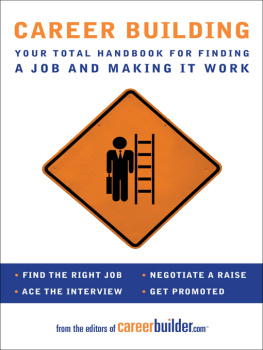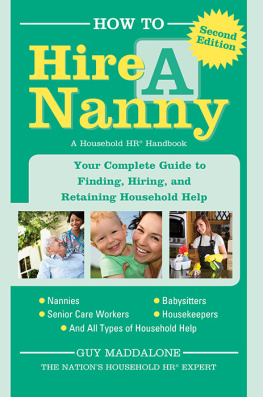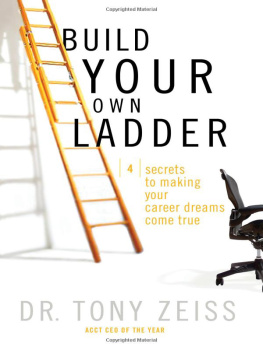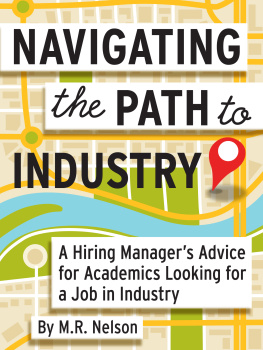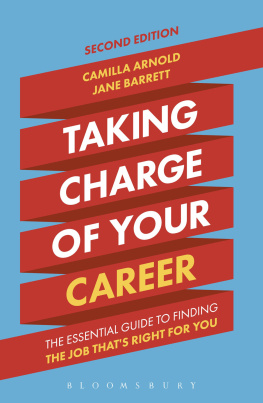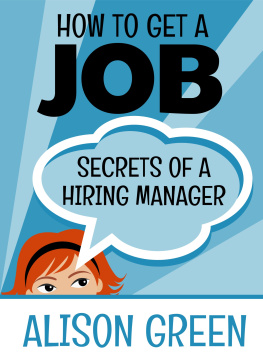Contents
Finding The One
Rsums and Cover Letters
Writing Your Rsum
Making a Good Impression on Paper
Five Steps to an E-Friendly Rsum
Cover Letter Dos and Donts
Finding the Jobs
Where to Search
Search Online with Keywords
Cracking the Job Listing Code
Protecting Yourself from Scams
Using a Staffing Firm or a Recruiter
The Internet Vs. Your Professional Image
Whats Happening on the Employer End
Youve Got a Rep to Protect
Its Not All Bad
Damage Control
Interviews 101 and Beyond
Interview Basics
How to Answer Employers Questions
Questions to Ask the Employer
Interview Body Language
Hiring Manager Secrets
Interview Mistakes
Damage Control
Thank-You Notes
The Job Offer
Weighing the Job Offer
Get Paid What Youre Worth
Salary Negotiation
What to Say in Your Salary Talks
Tough Love at WorkWorkplace Fundamentals
Work 101
Your First Days on the Job
Career Poison
Taming Workplace Mess
Meetings
Defeating Distractions
Working from Home
Using, Not Abusing, Technology
E-Mail Gaffes
E-Mail: The Good, the Bad and the Ugly
Spies Like UsBig Brother at Work
IM-ing at Work
Cutting the E-Leash
Excuse Me? Calling in Sick and Coming in Late
Taking Tardiness to the Next Level
The Art of Playing Hooky
No Excuses: When You Should Take a Sick Day
Work Donts
Its Not Them, Its You
Turning Your Irritating Behavior Around
Worst Things to Say at Work
What You WearHead-to-Toe Taboos
Playing Nice with Co-Workers
Its Not You, Its Them
Dealing with Office Scoundrels
Using Happy Hour to Get Ahead
When Love Knocks on the Cubicle Wall
Whos the Boss?
Impress the Boss
Things You Should Never Say to the Boss
Questions You Should Ask the Boss
Sticky Situations
Moving on Up
Performance Reviews
Surviving a Bad Review
Pitfalls to Avoid When Asking for a Raise
When Your Job isnt Working Out
Burnout
Signs of Job Burnoutand What to Do About It
Coping with a Job You Hate
Quitting Time?
Its That Time
Job Searching on Company Time
Gathering Good References
Quitting Without Burning Bridges
Getting the AX
Signs Your Job Is in Danger
Dont Wait and See
How to Get Fired
So You Were Fired
Moving on
Certified Job-Hopper? Pros and Cons of Jumping from Job to Job
Are You Employable?
Taking the Freelancing Route
What Job Is Right for You?
Changing Careers
A Job for Every Need
Did you know that 84 percent of Americans say theyre not in their ideal jobs? Eighty-four percent!
With roughly 153 million people in the U.S. labor force and the average American poised to hold 10.5 jobs in his or her lifetime, one things for certain: Thats a lot of job dissatisfaction.
To guide you through the sometimes scary world of work, weve compiled this handbook for every step of your career. Why mess with one book for rsums, another for interviewing and still another for salary negotiation? (Not to mention the self-help books you might need once you start your job!) Weve got everything right here for you.
The editors of CareerBuilder.com, the United States largest online job site, have assembled insider tips and tools for any stage of your job search and career. Weve divided this book into three sections: job searching, managing your job and co-workers and moving on to the next big thing.
The bottom line: Going to work is a lot of work. But having a successful job search and positive working relationships isnt rocket science. It really comes down to some simple fundamentals. Forget about all that touchy-feely stuff; were giving work advice straight up. Its tough love. Were not going to tell you to plant a seed and watch it growsometimes you dont even have time to water it before you know its rotten!
How many times have you been in this situation? Youre at a party making small talk and youre asked, What do you do for a living? This is often followed with the obligatory, Do you like your job? If the answer is an enthusiastic, I love it! chances are youll be picking the other person up off the floor. Thats because most people arent particularly satisfied with their work situations and would rather be doing something else. This doesnt necessarily mean making a total career change, but finding the right environment, duties and colleagues that fit.
But job searching takes time and work. And, lets face it, its tough to find the time or energy to focus on a job hunt when youve already got a full plateyour current job, family responsibilities, housework, errands, trying to stay in shape and having some sort of social life.
Whether youve had one job or thirty (ahem, is that something to brag about?), everyone could use a little help in the job search department. Even if youve never written a rsum before, well hold your hand through the process and, before you can say, Hire me! well have you in your next brilliant career.
Whats in it for you? Step-by-step rsum writing, cover letter advice and tips on everything job search related; from learning how to decode bogus job ads, to answering the most wrenching interview questions, to what to wear to make the best impression.
Welcome to the puzzlingand often frustratingworld of rsums and cover letters. These are your first chances to make a positive, lasting impression and therefore need to be done right. Were not saying theres a one size fits all strategy, but well guide you through portraying your best professional self. Apply these steps to your rsum and cover letter writing and put them to the test. If you still dont see results, go back, review some of these sections, and start making some small adjustments. Eventually, youll get to the right combination. When you notice employers are calling more often and youre getting more interviews, youll know youre there.
WRITING YOUR RSUM
STEP ONE: THE FORMULA
Hiring managers spend an average of one minute scanning a rsum. You have just a short window of opportunity to convince them that youre either fabulous or the most boring person alive. Which is it gonna be?
Here are the elements that your rsum should include:
CONTACT INFORMATION: Your name (if your formal name is Abigail, but you go by Abby, use Abby), address, phone number, e-mail address and Web site. Make sure to use a professional e-mail address for your job applications. Employers arent likely to call HotPants1234@hotmail.com.
CAREER SUMMARY OR OBJECTIVE: These give the hiring manager an idea of who you are immediatelybefore spending the 60 seconds skimming your rsum and deciding whether to bring you in for an interview. Many job seekers equate a summary with an objective. While both are two to three sentences appearing at the top of your rsum, in reality, they are very different.
An objective states a job seekers desired job description, and is often ideal for people who are just starting out in the workforce or changing industries. Some words of warning: It could pigeonhole you and limit how employers see you.

